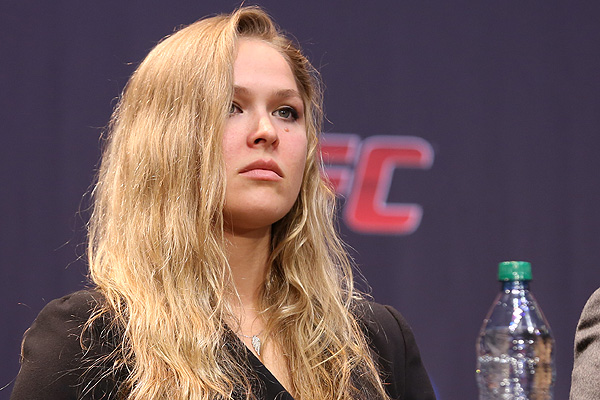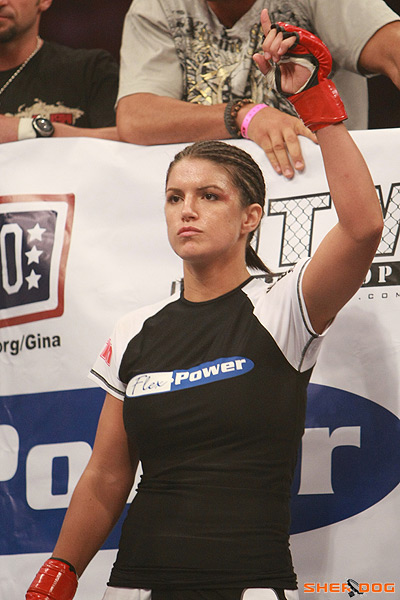Viewpoint: Options Beyond Armbars

The
silver screen beckons Ronda Rousey. | Photo: Dave
Mandel/Sherdog.com
We live in a world where a fictional pugilist has grossed more than $560 million, received a hall of fame plaque and is probably more recognized than all but a handful of real-life competitors who have spent years plying their trade in the ring without the benefit of lights, cameras, makeup and choreography.
So when the phone rings and it is really Rocky Balboa on the other end, asking in that distinctive slur of his if you want to work with him, it might be time to take a step back and reassess your goals. If you were Ronda Rousey and all of this was happening to you, you would have to be punch drunk not to.
Advertisement
“I am the best [expletive] fighter in the world, and I truly believe that, but you’re still rolling the dice no matter who you are, so I do have to kind of set up an exit strategy,” Rousey said. “That’s what I did wrong in judo. I followed it all the way until the end, and I didn’t put any thought into after.”
If Hollywood had not beckoned, then maybe such an admission would
not have created the bitter backlash it did. Perhaps the Olympic
bronze medalist would have been likened to someone such as Phillip
Miller, who exited the cage for good with both his record and
his faculties intact.
“You know, it’s a career that’s not supposed to be long,” Miller, who retired at 16-0, told Sherdog.com in 2009. “You’re supposed to get in, you’re supposed to put your mark in, and then get out. The longer you stay, the more long-term damage you do. For each fighter, it’s his own decision. How much is he willing to give up for that paycheck?”
However, Miller retired in 2003, before the UFC had a lucrative network television deal, before well-known sponsors came calling, before movie producers began scouring the Octagon for fighters with the right blend of toughness and charisma to cross over to the silver screen. Miller left the game before a lot of things, really -- the most obvious being the superstardom that has attached itself so naturally to Rousey. Only the most ardent followers of the sport remember Miller, who competed twice in the UFC before calling it a career. When he made his graceful exit to serve in the Los Angeles Police Department, there was not a legion of Internet critics at the ready to analyze his decision.
Today, when Rousey suggests she might be a short-timer, she is not commended for having a sound exit strategy, like Miller did. Instead, she finds out that, at heart, the MMA fan base is really just a bunch of spiteful “Siskel & Ebert” wannabes, many of whom do not forecast a bright future for Rousey the actress.

Photo: D.
Mandel/Sherdog
Carano last fought in 2009.
Gina Carano comparisons have been rampant since Rousey’s moonlighting gigs became common knowledge. Like Carano, Rousey is talented, attractive and tough. The difference between the two is that Rousey is the unquestioned queen of her weight class, a champion who exhibits a Royce-Gracie- circa-1993 mastery over the competition -- one armbar at a time.
As big a star as she was, the last moments of Carano’s career were spent in the fetal position, absorbing brutal shots from Cristiane “Cyborg” Justino in a Strikeforce 145-pound title bout on Aug. 15, 2009. Although she came close, Carano never returned to the cage after that night. It is not difficult to understand why.
According to California State Athletic Commission figures, Carano banked $125,000 in defeat, making her the first woman to earn a disclosed six-figure payday on card in the United States. Not bad, but the guess here is a lead part in the action flick “Haywire” compensated her more handsomely and without the trauma of having to absorb a beating from a muscular Brazilian.
Meanwhile, Rousey has not taken kindly to the negative response regarding her out-of-cage endeavors.
“To everyone giving me s--- for ‘hypothetically retiring’ someday -- I’ll retire when I feel like my mark has been made and I’m ready to make babies,” she wrote on Twitter.
A couple thoughts come to mind when processing Rousey’s star turn and the reaction surrounding it. One, as misguided as it might be, the groundswell of angry sentiment directed toward Rousey is actually a positive sign for women’s MMA. It means people care, probably more than they did at any other time since females began beating up each other in a cage for money. If that is expressed through hate on social media, forums and message boards, well, just chalk it up to the nature of the times. Rousey could have cured cancer and someone somewhere in cyberspace would have wondered why she did not bother to help the homeless. Two, at no point did Rousey guarantee she would be gone for good in 24 months; it was just something to consider based on past experience. Her competitive fires may very well continue to burn beyond that timeframe, and if they do not, two more good years of armbars, sound bites and trailblazing ain’t all that bad.
Rousey is on the verge of being in a unique position: she can fight because she wants to, not because she has to. There is no glory in holding on for too long, not if other opportunities await. After all, it was the fictional Rocky who got the fame and financial security while Chuck Wepner resides in relative obscurity, managing a liquor store in New Jersey after years of taking real punches.
Does any of this mean Rousey is destined for years of box office hits? Hardly, but she would be foolish to not at least consider the possibility.
Follow Tristen Critchfield on Twitter at www.twitter.com/TCritchfield52.
Related Articles






